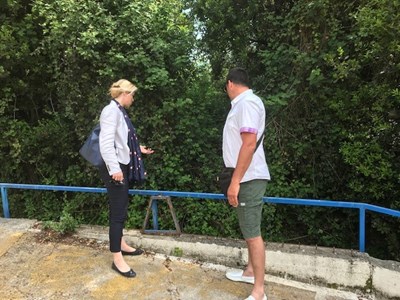
By: Jelena Janevska, NALAS Knowledge and Communications Manager
The living in the 21st century, like no other period before, thretens to endanger the Earth and its natural resources. The wide-spread consumerism has a tendency to overwhelm us with material goods that eventually have to end up somewhere. Being reused, recycled, properly taken care of, or dumped anywhere – the decision is to be made by us all, but operationalised by the waste management operators, and the municipalities, that in many cases are their owners.
Have you ever wondered how much waste do we produce? Where does it end up? Is the way we manage our waste the right one? How do we stand compared to others? These and many other questions are being addressed by the NALAS Benchmarking Report on Solid Waste Management in South-East Europe. We have in hand the last edition of the Report, available HERE.
Today, bringing the Report closer to you, we talk to Ms. Danijela Djurovic and Mr. Boran Ivanoski, who are part of the team that developed the Report. Namely, this report is a joint effort by the members of NALAS Task Force on Solid Waste and Water Management. It is utilising data from 2018 from ten economies of the SEE region.
***
Mr. Boran Ivanoski is NALAS Program Officer, in charge of the Task Force on Solid Waste and Water Management. Mr. Ivanoski has initiated the development of the benchmarking report and coordinated its three editions. Mr. Ivanoski is an engineer, a nature lover and environmentalist, with long-lasting experience in local government development.
JJ: Mr. Ivanoski, what was your guiding star when you initiated the NALAS Benchmarking Report on Solid Waste Management? To whom you address the Report and what it aims to achieve?
BI: The idea was initiated by the NALAS Task Force on Solid Waste and Water Management back in 2015. Within the Task Force, local practitioners were exchanging their challenges and discussed possible solutions. They concluded that there is a need to compare the status quo in SWM at local level among the 12 economies from the region of SEE. That’s why, they have decided to establish a systematic monitoring tool based on research methodology with 24 indicators that are measurable with data deriving from different national contexts and what is even more important they are comparable at regional level. Why comparable indicators are important, because the main aim of the report and this exercise itself is to learn from different experiences. Although we call the Report benchmarking, we would rather use the word bench-learning. It helps NALAS members to understand the current situation in their respective national contexts and to exchange with their peers from the region for better solutions. In this direction, our member Associations share the report among their members, the local governments, within their expert bodies that deal with SWM issues, national institutions, academia, etc. In addition, the Associations of local governments use the main findings of the Report and best practices for advocacy actions in negotiations with the line ministries.
***

Ms. Danijela Djurovic is a member of the NALAS Solid Waste and Water Management Task Force, on behalf of the Union of Municipalities of Montenegro, coming from the coastal City of Herceg Novi, a true pearl of the Adriatic Sea. Ms. Djurovic is an engineer, specialised in environmental protection. She is a Vice Mayor of Herceg Novi, a former President of the City Assembly, City Manager and Director of the Waste Management Company. This brings Ms. Djurovic to a unique position to not only understand the challenges of solid waste management, but also see and address them from the perspective of a high local level authority.
JJ: Ms. Djurovic, based on the Report findings and your professional experience, what are the main challenges that local governments and their waste management companies in South-East Europe face?
DDj: It is a common opinion that the lack of financing and high investments in waste management are the two basic issues that waste management companies and municipalities struggle with. Often central governments impose laws hard to be implemented on the local level and that is contributing to more stress when working within the sector. On the other hand, there are many good examples of waste management in simple solutions. It is not always needed to implement high-end solutions, but those that best serve the local needs and practices. Other challenge that is stressing the system is political influence. Unfortunately, due to political changes the decision-makers, but also waste management CEO’s are often changed, lacking the continuity of work and even more, investment ideas. Waste management is a specific sector. Either you love it or you hate it. Decision makers, when not coming from the sector, tend not to understand the specifics and needs, which leads to misunderstanding and poor management. Waste management definitely should be led by dedicated professionals from the sector.
Download the full interview:
 Interview SWM Report 2020
Interview SWM Report 2020